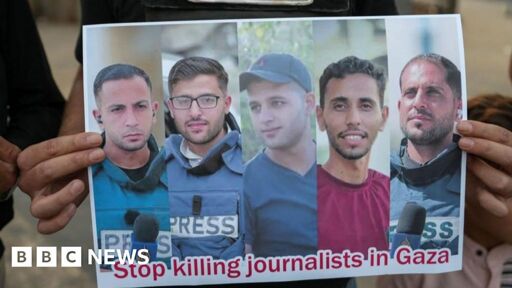from MyEdgyAlt@sh.itjust.works to world@lemmy.world on 12 Aug 12:05
https://sh.itjust.works/post/43933489
Five Al Jazeera journalists were killed by an Israeli strike in Gaza City on Sunday - among them 28-year-old correspondent Anas al-Sharif, who had reported prominently on the war since its outset.
[…]
The targeted attack on a tent used by journalists has drawn strong international condemnation including from the UN, Qatar where Al Jazeera is based, and media freedom groups.
[…]
Israel had previously accused Sharif of being a member of Hamas’s military wing - something he and his employer strongly denied. Reporters Without Borders (RSF), a media freedom group, said the allegations against him were “baseless” and called on the international community to intervene. "Without strong action from the international community to stop the Israeli army… we’re likely to witness more such extrajudicial mur

#world
threaded - newest
This article is so terribly tepid.
How can journalists write about the persecution of their calling so bloodlessly?
These people were more than innocent: they were so-gooders of the kind we all claim to support. They were not only supposed to be protected not only as noncombatants, but especially guarded by their attendance to a sacred mission. They, like aid workers and doctors and nurses and any care giver or person seeking to provide justice is a designated target when the goal of a military operation is extermination.
Has the BBC written an editorial confirming this?
You’ve been reading too much polemic instead of real journalism. That “bloodlessness” is a neutral tone that is one of the marks of professional journalism. It allows the reader to get the facts without telling them how to think or feel about them.
I think you’re partially right. It was a visceral reaction, but it’s true that they have to keep the house style.
I disagree that I’m reading “too much polemic instead of real journalism”. I think journalism is in crisis, and that the pursuit of “neutrality” in a post-truth era has severely weakened the fourth estate when it should be armed to defend its existence and fundamental values.
First, it’s a myth that news is impartial. Conventional news absolutely has a system of values: it’s inherently pro-truth, pro-freedom of thought, and democratic. Assassinating journalists out in the open and decreeing that they’re legitimate targets is a direct attack on fundamental principles of journalism and free society. Journalism does not need to be neutral on whether assassinating journalists is wrong to retain their legitimacy.
Sadly, these institutions are not experienced or practiced at navigating the challenge of addressing this kind of story. The real story here is that because the practice of journalism undermines what the ruling coalition considers to be in the national interest, Israel has decided as a matter of national policy that it will no longer abide by Article 79 of the Geneva convention. They have not admitted it explicitly, but there is an obvious pattern of fact that goes beyond hundreds of assassinations all the way to their law against publishing news that undermines “national morale”. That, imo, is the story. Really stop and think about what a monumental and newsworthy thing it is for a major world power to so publicly confirm a policy that has been until now a matter of dispute.
But the BBC can’t within their current operating guidelines find a way to tell that very vital story. That’s a tragedy.
I think you should really consider the main article from the BBC on the topic, which is here: www.bbc.co.uk/news/articles/ceqyyrp3yq9o In comparison to this profile, it has a lot more context.
Here the BBC lays out the full facts, including the IDF’s accusations, and the reasons why those accusations are to be viewed with skepticism. It relates statements by the IDF three times, compared to 5 separate quotes from Al-Jazeera, the UN and the CJP condemning the killing, plus a letter signed by the BBC about the situation for journalists in Gaza.
In the “post-truth era” we need journalistic institutions which resist the temptation to polarise their coverage, and instead to provide neutral and balanced output that can be trusted by everyone. The tragedy of the post-truth era is the disintegration of a collective understanding of the world. By relating the facts with a neutral tone, an outlet maximises the audience which can gain that common understanding, which is far more important than instructing the audience on how to respond emotionally to a subject. It’s not like the BBC are burying the problems of Israel’s targeting for their readers: they lay out how the world is reliant on Gaza-based reporters to get the truth out, and quotes the accusation that Israel wants to prevent the world from seeing their crimes.
My question to you when you read the BBC’s coverage is: are you not outraged by the facts? I am.
I wanted to just add this article I just came across:
apnews.com/…/jazeera-gaza-journalist-killed-israe…
I think this captures exactly what I was describing. And I don’t think it’s a polemic or opinion piece, I think it’s just better journalism.
I agree with you. I think that what most people think of as “objectivity” isn’t a thing that exists in reality, but as an ideal that we can strive towards. In practice, there is no neutral journalism — especially in this topic, my instinct is to be extra cautious of pieces that appear objective at first glance.
The piece you shared is a good example of how the bias in reporting can be found both in the micro-level prose, and the macro level framing of the piece (in this case, the macro framing being that the killing of journalists sets a scary precedent).
Can we stop saying “Israel claims” unless we follow it up with “which is a blatant fucking lie with no basis in reality”